

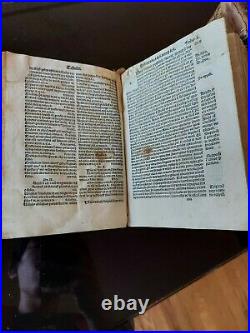
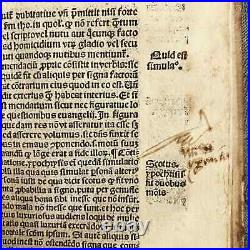


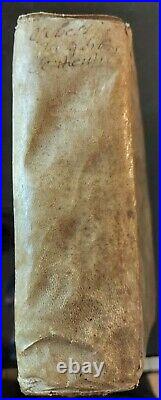
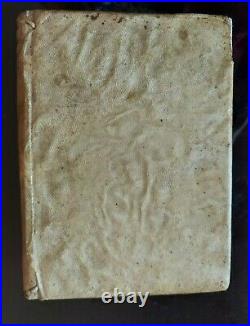
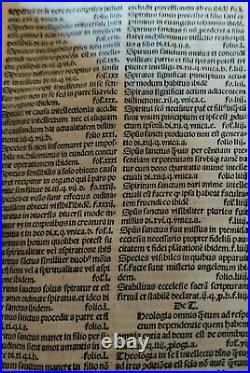

De ORBELLIS, Nicolaus (author). Expositio in quatuor libros Sententiarum Petri Lombardi. (Exposition of the four books of Sentences of Peter Lombard) Edited by Thomas Silvestris. Printed by Felix Baligault for John Richard. Paris, 10-12 October 1498. Offered for sale is a Latin incunabulum (a book printed before 1500). This is a 1498. Book of commentary on the classic medieval philosophical discourse, the Sentences of Peter. Printed in Paris in gothic type. Containing capital spaces with guide-letters. BMC VIII:174. 12047 – Not in BSB-Ink. This book has 366 of 392 leaves (732/784 pages). There are only two. Copies of this book listed in the World Catalog. Since the other copy is in the US Library of. Congress, this is the only copy held in private hands. I have been a collector of antiquarian and rare books for 40+ years. Consolidate and reduce the size of my collection. As I have bought books over such a long. Occasional old, near-contemporary marginal annotations and a few manicules are present. Throughout, some of these are faint. An old signature is present on the front flyleaf that. Ex libros SLB Beza. The title is inked at the head of the spine in a. Contemporary (or nearly so) hand. Bound in old, somewhat soiled vellum covering paste-paper boards. The top and bottom cords. That attach the text block to the boards and vellum were inserted through small incisions at the. Head and foot of front and back covers and are thus visible at these points. There is a single. Closed crack (less than 2.5cm/ 1 inch) in the vellum originating from the cord incision at the. Head of the front cover (pictured). The corners are a bit bumped and the vellum is a bit frayed. At the edges, though this is mostly at the front fore-edges. Vellum has slight wrinkling and. Occasional spotting that is clearly visible in the pictures provided. The vellum at the head and. Foot of the spine is bumped, enough so that the bottom cord is slightly exposed. Overall is in quite good condition, as it is still supple to the touch and in no danger of cracking at. The spine or elsewhere. The text block is tight with no shelf lean or cocking. The pages are trimmed somewhat close at. The top although this does not cut into any of the page headings or pagination. Does shave slightly into some of the old marginal notes that are hand-written. Bottom margins are much more generously sized. All of the marginal glosses are fully present. And not close to the page edges. Old damp-staining is seen occasionally throughout; this is. Mostly in the first few quires and a few pages towards the end. Pages are lightly yellowed from. Age-toning, this is not obtrusive. The edges of the text block were originally stained red. Although this is now only faintly visible. Quire n is loosely inserted. This appears to be the result. Of an error on the part of the binder. These six leaves have pin-prick stab holes in the first leaf. But there is no sign that this quire was ever sewn into the binding and these page edges are not. The binding was clearly executed without any of the missing leaves being present, as. There is no sign of leaves being removed after binding. Hole in blank bottom margin of ff. Old repairs to top corners of a few pages, with occasional loss of a few letters. Provided for further illustration of condition. This book lacks the first 3 signatures (24 leaves) and two additional leaves. Printed in 4 parts, as is uniformly so in consequence of the Sentences being published in 4. Paginated throughout as folios e. Xvii although this is an octavo printing with. Eight leaves per signature: ff. Lxxxiij (= 83)-[25] ff. Xxxviij (= 46)-[10] ff. Lviij (= 48)-[8] ff. 158-[12] ff. Lacking initial quires a-c8 of Part I = 24 ff. V7 and woodcut mark. On V8 of Pt. The concluding Tabula (10 leaves) and final printers leaf are present see. History of Peter Lombard. Peter Lombard was born to a poor family in 1196 in Lumellogno (near Novara), Italy. He likely obtained his early education at. The cathedral schools of Novara and Lucca, followed by further study at Bologna. Patronage of Otto, bishop of Lucca, and additional sponsorship and financial support from St. Bernard, Peter carried out further study at Rheims. A letter from St. Bernard to the Abbott. Gilduin of the monastery of St. Victor recommended Lombard for continuing studies in Paris. The letter indicates that this stay was intended to be limited in duration, per breve tempus. Usque ad Nativitatem Virginis, (for a brief period until the Nativity of the Virgin). Asserts that Peter was the brother of the canon lawyer Gratian of Bologna and the theologian. All evidence, however, indicates that these are untrue. Some information is available about Lombards scholarship in France and his relationship with. Other theologians as recorded by contemporaries and pupils. Prominent among these is John of. Lombard met Peter Abelard and Hugh of St. Victor two leading contemporary. Theologians and studied the lectures of Abelard while at Paris ca. Magister (professor) at the Cathedral School of Notre Dame in Paris ca. In 1148 he is. Known to have been in Rheims with Robert of Melun. While there he participated in theological. Discussions with Adam du Petit-Pont, Hughes of Amicus, Gilbert de la Porrée and others. A manuscript of the. Sentences dated 1158 still exists, but this work was certainly finished by about 1150. The immediate success of the Sentences was not universal and did create some controversies, a. Tribute to its recognized greatness is that he is called the “Magister Sententiarum”, or simply. The “Magister” even during his lifetime. Peter was named Archbishop of Paris in 1158 or 1159, although he held this office for only a. Short period of time. He was succeeded in 1161 by Maurice de Sully, who began construction of. The present Cathedral of Notre Dame. Although the exact date of his death is uncertain, it was. Not later than 1164. In the years immediately after there are records in the cartulary of Notre. His original manuscript of the Sentences. Is also noted as bequeathed by Stephen Langton Archbishop of Canterbury to the library of. The Four Books of Sentences (Libri Quattuor Sententiarum) is a book of philosophical and. It is a systematic compilation of theology; the title derives its name from. The sententiae, which are authoritative statements on biblical passages. The sentences are a. Compilation of extracts from the Bible, the Founding Fathers especially St. Other sources of theological authority. Lombard was the first scholar to successfully arrange. These materials in a systematic order. His genius in doing so comes also from his selection of. Critical passages, his thorough and critical application of existing theological scholarship, and his. Ability to reconcile apparently contradictory viewpoints in his analysis. After its composition, the Sentences became a standard work of theology throughout the. There is no work of Christian literature except for the Bible itself that has been. Commented upon more frequently. All the major medieval thinkers – Albert the Great, Thomas. Acquinas, William of Ockham, Gabriel Biel – were influenced by it. The influence of the. Sentences continued for centuries. Even the young Martin Luther wrote glosses on the. “Sentences” as part of his academic exercises. The four books of the Sentences are. This book discusses God, the Holy Trinity, Gods attributes, divine. Providence, predestination, and evil. This book covers creation, angels, demons, the fall from grace, and sin. Jesus the Savior of Fallen Creation. This book covers the Incarnation, the Redemption. The Sacraments and Gods Grace. This book deals with the sacraments in general, the. Seven sacraments in particular, the four final virtues, death, judgment, hell, and heaven. In a narrative that addresses a long series of questions, the Sentences covers the entire body of. Christian doctrine and unites it in a systematized whole. Towards the thirteenth century, the. Various books were divided into distinctions (pauses or divisions), though Lombard originally did. Nothing more than have the questions follow one another. In early manuscript form, these. Questions do not always bear the same title as later publication. The method and purpose of the Sentences reflects the state of scholarship and contemporary. Theological questions as of the time of its writing. The teaching or the laying down of. Unassailable doctrine from the Church authorities is comingled in the narrative with the. Freedom of thought and speculation arising from dialectics. Lombard steered a conciliatory. Course between these extremes. Although he admired Peter of Abelard, Lombard studiously. Avoids the angry pragmatism and controversial errors of doctrine espoused by his former. Lombard uses the Bible as the revealed word of God, but he also gives reason its due. Role in applying scripture to real life. In this he is a forerunner of Thomas Aquinas. Abelard, Gratian, Hugo of St. Victor, Ivo of Chartres, and Alger of Liege are chief sources for the. Theological foundations of Liber Sententiarum. Among the founders of Christianity St. Is quoted frequently as is Ambrose, Jerome, and Hilary. John Damascene is heavily quoted. Although the other Greek Fathers of the Church are rarely cited. The Sentences was not a significantly original work. It was openly intended to be mainly a. Whole “distinctions” have been traced to earlier sources; scarcely more than ten. Lines have been found to be completely original. Lombard makes clear that his plan was for the. Sentences to serve as a single, secondary source for many different earlier, scattered works. Yet, the Sentences has great merit. Lombard opposed the excesses of sheer rhetorical. Dialectics and well as the blind adoption of doctrine. He also rejects the arrogant separation of. He arranged traditional doctrines and theories in a system and. Summarized the controversies and range of opinions on theological questions. Solutions to many questions stimulated the thought of both students and fellow academics. Lombard was largely but not wholly an orthodox Christian. In many cases he does not propose. A final solution to controversial questions. The Sentences was not immediately adopted as a universal, standard text. Attacked during his lifetime and after his death, especially by Gautier of St. His proposition on “Christological nihilism” was condemned by Pope Alexander III. Bonaventure mentions eight additional theses that were later rejected by theologians. Lateran Council of 1215 an attempt was made to ban But the overall success of the Sentences. And its approach to theology was incontestable. The Sentences remained until the sixteenth. Century the standard text upon which each future doctor had to lecture during two years of. At the Fourth Lateran Council of 1215 a proposition was put forward to ban the Sentences as a. This attempt was roundly defeated however and the second canon began a. Profession of faith with the words: Credimus cum Petro [Lombardo]. Peter Lombards most controversial doctrine in the Sentences was the association of Charity. With the Holy Spirit. This is stated in Book 1 with distinction 17. When we love both God and. Our neighbor, this love literally is God or is of God. We are thus taken up into the life of the. Although this has never been formally declared against the orthodoxy of Christianity. Few theologians have been quite so audacious in association of the virtue of charity with the. Essence of God or the Trinity. Lombard also was the first to publish the standard Roman Catholic list of seven sacraments. To this time, anywhere from two to twelve sacraments had been proposed. Proposition of a perfect number of seven sacraments was rapidly accepted by theologians. Though not all immediately agreed to the same seven as proposed in the Sentences. Selection of the seven sacraments was defined as orthodoxy by the Council of Florence in 1439. Rarity of this Book. The World Catalog locates only two copies of this edition of the Sentences, one in the US. Not listed in the British Museum Catalog. No copies listed in the National. The item “Exposition of The Four Books of Sentences of Peter Lombard 1498 Latin Incunabula” is in sale since Sunday, July 11, 2021. This item is in the category “Books & Magazines\Antiquarian & Collectible”. The seller is “fortujm” and is located in Silver Spring, Maryland. This item can be shipped to United States, Canada, United Kingdom, Denmark, Romania, Slovakia, Bulgaria, Czech republic, Finland, Hungary, Latvia, Lithuania, Malta, Estonia, Australia, Greece, Portugal, Cyprus, Slovenia, Japan, China, Sweden, South Korea, Indonesia, Taiwan, South africa, Thailand, Belgium, France, Hong Kong, Ireland, Netherlands, Poland, Spain, Italy, Germany, Austria, Bahamas, Israel, Mexico, New Zealand, Singapore, Switzerland, Norway, Saudi arabia, Ukraine, United arab emirates, Qatar, Kuwait, Bahrain, Croatia, Malaysia, Brazil, Chile, Colombia, Panama, Jamaica, Barbados, Bangladesh, Bermuda, Brunei darussalam, Bolivia, Ecuador, Egypt, French guiana, Guernsey, Gibraltar, Guadeloupe, Iceland, Jersey, Jordan, Cambodia, Cayman islands, Liechtenstein, Sri lanka, Luxembourg, Monaco, Macao, Martinique, Maldives, Nicaragua, Oman, Peru, Pakistan, Paraguay, Reunion, Viet nam, Uruguay.
- Year Printed: 1498
- Modified Item: No
- Country/Region of Manufacture: France
- Topic: Religion
- Binding: Vellum
- Region: Europe
- Author: Nichlaus De Orbellis
- Subject: Philosophy
- Personalized: Yes
- Original/Facsimile: Original
- Language: Latin
- Signed: No
- Publisher: Felix Baligault
- Place of Publication: Paris
- Special Attributes: Incunabula
